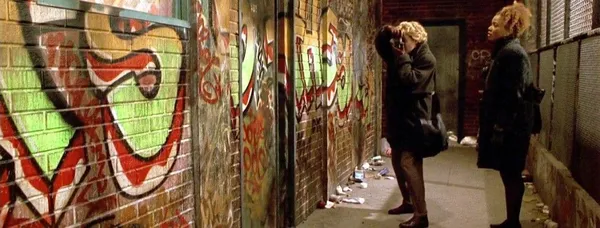Eye For Film >> Movies >> Candyman (1992) Film Review
Candyman
Reviewed by: Jennie Kermode

An urban legend focused on the deaths of morally transgressive teenagers. A man with a hook for a hand. A man who is full of bees. A man who has been dead for over a century but will reappear to take your life if you stand in front of a mirror and say his name five times.
Sounds ridiculous, doesn't it? But by using that premise, Candyman was able to attract - and, by all accounts, satisfy - a crowd of young horror fans who would otherwise never have contemplated going to see a film with its underlying themes, and would likely have dismissed as ridiculous folklore the bloody reality of America's Jim Crow era.

When 12 Years A Slave was released, many critics noted that it had taken an outsider to fully expose the horrors of slavery in the US. Candyman, based as it is on the work of English author Clive Barker, might be seen in a similar light, though its approach is very different. Taking on the role of the legendary figure, Tony Todd was attracted to the ambiguity that the character offered, the idea of a man who becomes a monster due to the actions of others but who might still be redeemed by love. Opposite him, Virginia Madsen, who always punched above her weight in genre films, links that troubled past with 1980s Chicago and strikes a difficult balance, largely retaining audience sympathy despite being blinded by privilege in a way that becomes dangerous for the black people with whom she interacts.
Madsen plays Helen, an academic writing a thesis on urban legends. She becomes intrigued by the story of the Candyman after learning that local folklore connects it to an apartment block not far from where she works. That block, though, is in a very different world. Leaving her white colleagues and black cleaning staff behind, and taking along nervously middle class black colleague Bernadette (Kasi Lemmons), she enters a housing estate patrolled by gangs of young black men who are troubled by her presence on their territory. There she finds the Candyman commemorated in the very flat where the killing allegedly happened. Vivid murals adorn mouldering walls. A public toilet block resembles the one in Trainspotting. Some locals try to take her into their confidence, but they're afraid of the potential consequences. The line between supernatural and material threat blurs in a way that Helen struggles to understand - until, of course, it's too late.
Throwaway imperilled teens aside, the performances are strong throughout, with a young Vanessa Williams standing out as a mother trying to protect her infant son. Director Bernard Rose does an impressive job of steering the actors, and also contributes visual flair. In the opening shot we see the city from above, focusing on its grid system, layer upon layer of straight lines. As the story develops, the visual theme of layering remains, reflecting the layered storyline that conjures up the past through the present, but the straight lines increasingly break down, the final scenes shot among ruins. Alongside this, Philip Glass' brilliantly constructed score gradually shifts from very formal minimalism to something far more complex.
There are problems with Candyman. Despite the importance of the concept of things breaking down, the story could have benefited from more incisive edting to create something more cohesive. The slow narrative suits the subject well and allows tension to build, but loses its grip too often due to lapses in pace. Some of the more formulaic parts of the story - a sub-plot around adultery and Helen's difficulty inn getting people in authority to listen to her - serve the greater narrative well enough but are still a little too cheesy in their execution. The ending is clumsily handled and doesn't have the impact that it should. But despite these flaws, this unusual bold film is well worth watching. The real tragedy is perhaps that it has stood the test of time so well and we have not, after 25 years, reached a point where the inequalities it portrays seem ridiculous.
Reviewed on: 01 Jun 2017

















